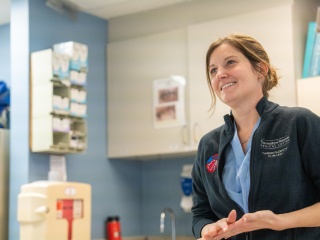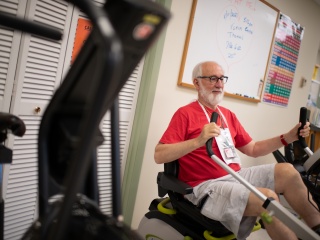Nuclear Cardiology
Nuclear Cardiology at UVM Health
Nuclear cardiology is a part of a comprehensive diagnosis for heart conditions, allowing your team to see your heart in detail through advanced imaging. Our nuclear cardiology program offers a collaborative approach to diagnosis, bringing together the expertise of cardiologists and radiologists.
The nuclear cardiology specialists at University of Vermont Health are experts in the diagnosis of complex heart conditions, conducting more than 2,500 nuclear cardiology studies a year in patients from across Vermont and northern New York.

Why Choose UVM Health?
As one of the leading heart and vascular programs in the region, we offer:
- Innovative technology: Our cardiologists and radiologists use leading-edge diagnostic technology to create clear, detailed and high-resolution images of your heart. We are the only providers in Vermont offering positron emission tomography (PET) nuclear cardiac studies.
- A team of experts: Your integrated, multidisciplinary nuclear cardiology team may include nuclear medicine technologists, noninvasive cardiology specialists, nurses specializing in stress tests and cardiology technicians. They work closely together to ensure an accurate diagnosis for your heart condition.
- Quick turnaround time: We understand that waiting for results can be anxiety-provoking. Our cardiologists strive to get reports to your doctor quickly, with an average delivery time of four hours after your testing.
Conditions We Diagnose With Nuclear Cardiology
The information gained from a nuclear cardiology test is invaluable in obtaining an accurate diagnosis for your heart condition and helping your cardiology team to create an effective treatment plan.
Nuclear cardiology is used to diagnose a wide range of heart conditions, including coronary artery disease and some types of cardiomyopathy. Your doctor may recommend a nuclear cardiology test to evaluate:
- If symptoms you are having are caused by blockages in the heart arteries
- If your arteries are narrowed, blocking the flow of blood to your heart
- Evidence of heart disease
- What type of treatment may be most effective for you (whether you need medication or a procedure such as angioplasty)
- Whether you have certain heart conditions known as cardiac sarcoidosis or cardiac amyloidosis
What to Expect From a Nuclear Cardiology Test
A nuclear cardiology test takes detailed pictures of your heart twice, once while it is at rest and once while it is “stressed” (usually after exercise, such as walking on a treadmill). For patients who are unable to walk on a treadmill, your provider will give you medication to simulate the effect of exercise on the heart.
Types of Tests
There are two types of technology used to conduct nuclear cardiology tests. Both examine the blood flow to your heart muscle (myocardial perfusion). Your provider will determine which of the following types of nuclear study is best suited for your needs.
- Single photon emission computed tomography (SPECT) study: During the test, your provider will look for signs of ischemia (a narrowing of your arteries). This test typically takes 3-4 hours.
- Positron emission tomography (PET) study: This test is similar to the SPECT test but is much shorter, taking about 45 minutes. In addition to generating images of the blood flow around your heart like SPECT, it also calculates heart blood flow numbers which can make the test more precise. PET studies are often used for patients with higher BMIs.
Test Procedure
During the test:
- Your cardiology technician will inject a small amount of a radioactive tracer (radionuclide) into your arteries. This tracer only stays radioactive for a short time, with a half-life between 2 minutes and 6 hours.
- The heart absorbs the tracer.
- A high-resolution camera takes still and moving pictures of your heart.
- The nuclear cardiology team will analyze your results, examining the blood flow to your heart. This can indicate whether there may be a blockage in an artery.
Awards & Certifications
American College of Radiology Certification
We are certified for Nuclear Cardiology by the American College of Radiology.
Locations near you
Share your location to see nearby providers and availability
118 Tilley Drive
Suite 102
South Burlington, VT 05403-4450
133 Park Street
Malone, NY 12953
62 Tilley Drive
Suite 101
South Burlington, VT 05403-4407
130 Fisher Road
MOB-A Suite 2-1
Berlin, VT 05602-9000
214 Cornelia Street
Suite 203
Plattsburgh, NY 12901-2332
115 Porter Drive
Middlebury, VT 05753-8527


